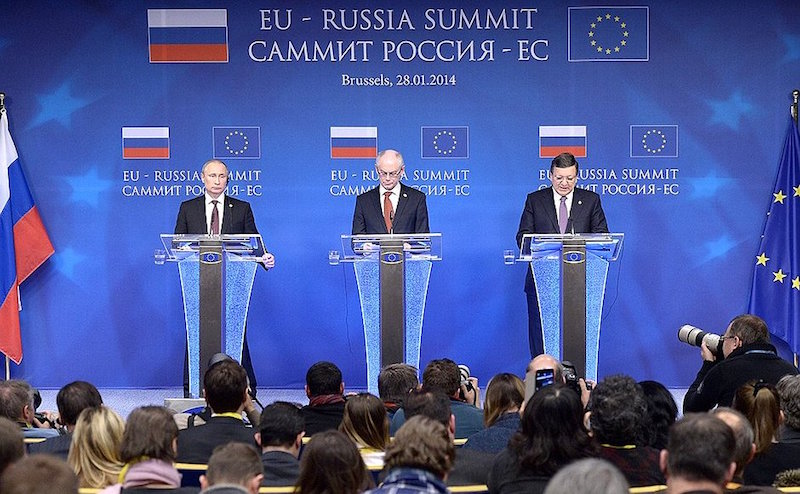Current events across Europe demonstrate that now is not a productive time to be a proponent of the European Union or any movements that promote continental solidarity. The problems are broad, complex, and have a different impact on each EU member state. Disunity is apparent in social policies concerning the management of the ongoing refugee crisis. The upcoming referendum in the United Kingdom over ending its EU membership, colloquially known as Brexit, has produced both Eurosceptic and pro-EU discourse. Shortly after that momentous decision, European economic and political sanctions against Russia are set to expire in July. How the EU manages the expiration of these sanctions will reveal either a united front or further discord.
Sanctions against Russia were divided from the start of the first round. Although the most powerful EU members were supported by numerous states in their call to place restrictions on specific Russian individuals and enterprises, a small camp vocally argued against any such actions. Italy was joined by Austria, Bulgaria, Cyprus, Greece, Hungary, Slovakia and Spain in its concerns that imposing regulations on Russian trade with Europe, would dramatically damage its own domestic economy. By the third round of injunctions against Russia, these states sided with the EU heavyweights and their persuasive lobby.
As the question to extend these sanctions looms, there are many mixed messages. At the state level, Germany emerges as one of the most confused governments in the EU. The official German policy is in support of continuing strong penalties against Russia, and publically considers the removal of sanctions as premature. Nevertheless, the other party in the German grand coalition, the Social Democrats, are pushing for rapprochement with the Russians. Foreign Minister Frank-Walter Steinmeier warned that resistance to extending economic pressure against Russia was growing across Europe, and such a development would dramatically hinder the EU’s unity and integrity.
Specific industries and their government representatives are siding with lifting economic impediments to doing business with Russia as well. Russia’s retaliatory sanctions targeting the agribusiness sector severely affected the earnings and export capabilities of European farmers. As a consequence, agriculture ministers from major customers France, Germany and Italy stated they would lift the sanctions if such powers were provided in their portfolio. Members of the original group siding against sanctions, Austria, Bulgaria, Hungary and Slovakia, have resumed their calls to end penalties against Russia. Besides farming, enterprises specializing in machinery and tool production in Germany have voiced similar demands of the German government. The EU has come to fully comprehend that Russia is not only important for its natural gas needs, but is an important driver of its consumer economies as well.
The tension between EU states and the rise of Euroscepticism, demonstrate that all the effort applied to foster a common European identity has not been as rewarding as originally envisioned. A successful European identity would have resulted in a universal set of values and shared perceptions of how the continent would tackle the problems it is currently encountering. Cohesion at the supranational level has utterly failed at a time when the image of a strong Europe is extremely important. The decisions of some member states to favor resuming normal relations with Russia demonstrate that countries will continue to pursue policies that benefit their own national agendas, and protect their own industries, because they know relying on the EU can be detrimental.
All three rounds of EU sanctions have not achieved their overall objective. Russia has not returned Crimea to Ukraine, or admitted that the annexation was an act of aggression. Further, the Russians staunchly continue to deny aiding or directing the separatists in the ongoing conflict in the Donbass. Consequently, measures prioritized in the Minsk II agreements have not been fulfilled. The policies of the Putin administration have not changed either. While it was believed that restrictions on the Russian business class would place political pressure on the Russian president to change course, the regime in Moscow remains relatively popular. It is average Russian people who are experiencing the brunt of the retaliatory sanctions, and they do not hold the power to make sweeping political changes. The insecure Russian economy and long list of banned foods means that their choices are limited as well as more expensive.
There is no denying that sanctions have negatively influenced the Russian economy. Constraints on business interactions and investments with the expansive EU market damaged the viability of Russian interests. A fluctuating energy market aided the instability of the ruble also. Nevertheless, the harm to the Russian economy was adequately mitigated and Russia turned its attention to other geopolitical targets. Markets from fellow BRICS economies (Brazil, Russia, India, China and South Africa), as well as other international markets, became prime suppliers for Russian demands. Aligned with the complaints from concerned agricultural or mechanical producers in the EU, it seems that extending sanctions against Russia might not be the answer. In the end, the Russian government presents an image of being steadfast and the EU looks in disarray.
Russia – EU Summit. Picture courtesy of Kremlin.Ru.
Disclaimer: Any views or opinions expressed in articles are solely those of the authors and do not necessarily represent the views of the NATO Association of Canada.




